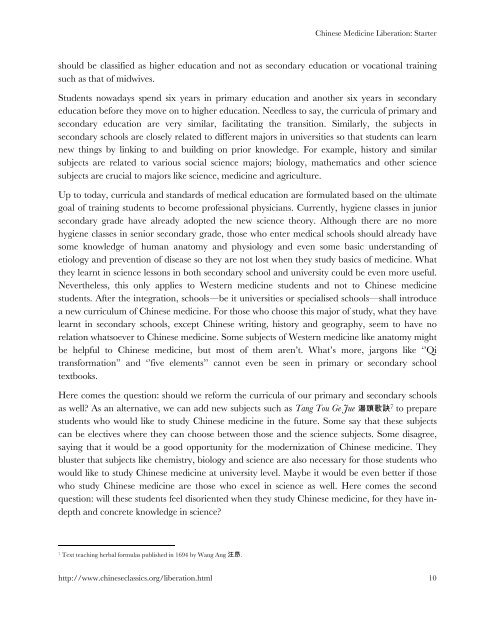starter
starter
starter
You also want an ePaper? Increase the reach of your titles
YUMPU automatically turns print PDFs into web optimized ePapers that Google loves.
Chinese Medicine Liberation: Starter<br />
should be classified as higher education and not as secondary education or vocational training<br />
such as that of midwives.<br />
Students nowadays spend six years in primary education and another six years in secondary<br />
education before they move on to higher education. Needless to say, the curricula of primary and<br />
secondary education are very similar, facilitating the transition. Similarly, the subjects in<br />
secondary schools are closely related to different majors in universities so that students can learn<br />
new things by linking to and building on prior knowledge. For example, history and similar<br />
subjects are related to various social science majors; biology, mathematics and other science<br />
subjects are crucial to majors like science, medicine and agriculture.<br />
Up to today, curricula and standards of medical education are formulated based on the ultimate<br />
goal of training students to become professional physicians. Currently, hygiene classes in junior<br />
secondary grade have already adopted the new science theory. Although there are no more<br />
hygiene classes in senior secondary grade, those who enter medical schools should already have<br />
some knowledge of human anatomy and physiology and even some basic understanding of<br />
etiology and prevention of disease so they are not lost when they study basics of medicine. What<br />
they learnt in science lessons in both secondary school and university could be even more useful.<br />
Nevertheless, this only applies to Western medicine students and not to Chinese medicine<br />
students. After the integration, schools—be it universities or specialised schools—shall introduce<br />
a new curriculum of Chinese medicine. For those who choose this major of study, what they have<br />
learnt in secondary schools, except Chinese writing, history and geography, seem to have no<br />
relation whatsoever to Chinese medicine. Some subjects of Western medicine like anatomy might<br />
be helpful to Chinese medicine, but most of them aren’t. What’s more, jargons like ‘’Qi<br />
transformation” and ‘’five elements’’ cannot even be seen in primary or secondary school<br />
textbooks.<br />
Here comes the question: should we reform the curricula of our primary and secondary schools<br />
as well? As an alternative, we can add new subjects such as Tang Tou Ge Jue 湯 頭 歌 訣 7 to prepare<br />
students who would like to study Chinese medicine in the future. Some say that these subjects<br />
can be electives where they can choose between those and the science subjects. Some disagree,<br />
saying that it would be a good opportunity for the modernization of Chinese medicine. They<br />
bluster that subjects like chemistry, biology and science are also necessary for those students who<br />
would like to study Chinese medicine at university level. Maybe it would be even better if those<br />
who study Chinese medicine are those who excel in science as well. Here comes the second<br />
question: will these students feel disoriented when they study Chinese medicine, for they have indepth<br />
and concrete knowledge in science?<br />
7 Text teaching herbal formulas published in 1694 by Wang Ang 汪 昂 .<br />
http://www.chineseclassics.org/liberation.html 10


